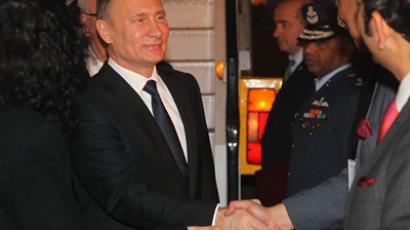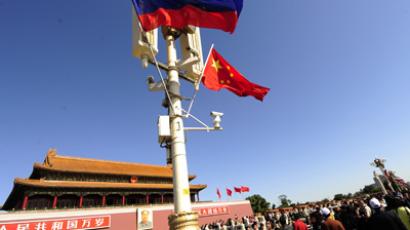‘BRICS multiplies influence, but doesn’t challenge anyone’
Ahead of the annual BRICS summit, Russia’s Deputy Foreign Minister Sergey Ryabkov spoke to RT and the Voice of Russia about BRICS’ growing influence, the bloc’s position towards the Syrian crisis and Russian-Chinese relations.
RT:Obviously we are speaking with you ahead of the BRICS summit and we are expecting that the Syrian conflict will be discussed there between the member states of the BRICS organization. The question is: lately we’ve heard from [Syrian President] Bashar Assad a plea for help from the BRICS countries. Would that be possible, that BRICS countries would be able to help the Syrian situation? And how unified is the position of the BRICS countries on the Syrian conflict?
Sergey Ryabkov: Indeed, it's unavoidable, and it's good that Syria and everything that relates to this issue will be on the agenda. The leaders will have opportunity to exchange views on this. Let me tell you that we are not in any way underestimating the gravity of the current situation and all the problems which we face in Syria. This is not an issue, at least for Russia, to support the government in Damascus. We are not in any way advocating the case of Bashar Assad. We are working and we do believe that it's still possible to achieve this goal towards establishment of a platform for inter-Syrian dialogue, for some reconciliation.
The impartiality here is crucial. Others that have more influence upon Syrian opposition should do more — by far more — to impress these people that they should be really engaged with the government (with the authorities, I'd put it rather this way). There's no alternative. Alternative is more casualties, more tragedy — what we experience there daily. And others at BRICS have very similar views. It has been proven through several events. National positions are being explained by spokespersons, by leaders themselves, and I am very sure that Durban would add to this, what we believe, is a unified and coherent message of what should be done there to resolve the problem.

Voice of Russia:There is some speculation in the West that Russia and China are trying to bring BRICS as a major geopolitical force capable of deposing the United States and NATO from the leading positions. So how does this standpoint reflect the real state of affairs?
SR: I will categorically deny any intentions towards this end. We in Moscow do think that BRICS has now a very established agenda and any politician, any diplomat, who is interested in what is going on there is very welcome to read through final documents of five summits, see where things move to, how they evolve.
Earlier today, on March 21, we have published our own national concept of Russian policy towards BRICS and within BRICS. It's an interesting reading as well. We are not trying to counterbalance anything in the world. We are trying to catch the wave, the tide of changing reality in the world economy, in the world politics and kind of identify areas where it would be natural for countries as big, as influential, as China, India, Brazil, South Africa and Russia to work cooperatively.
This is very synergetic. We are talking about multiplying authority and influence — no doubt about it, but this is not to challenge anyone. This is to further our own interests and ensure that our ability to achieve these goals is growing and implemented in practical action.
Russian-Chinese relations on upward trajectory
RT:As long as you mentioned China there, it's obviously one of the biggest members of the BRICS organization along with Russia, we see that the new chairman of China is coming to Russia. This is his first visit, just a week after becoming the new leader of the country. We also saw that Vladimir Putin made a state visit to China just days after he was elected president for the third time. Are we no longer in a difficult situation? Are we no longer in difficult ties? Is it something of a new era for the Russian-Chinese relations?
SR: Forgive me for some bluntness, but the difficult situation in our bilateral relationship brings me, or rather my memory, to the days of the spring of 1969 when clashes took place on the island of Damansky and elsewhere. Since that I would dare say we have only progressed and the state of the relationship right now can be very fairly described as an advanced strategic partnership. We do not have any major unresolved problems in our relationship with China, and the very fact that the newly-elected Chairman Xi of China is visiting Russia on his first official trip abroad is a very symbolic and important gesture.
Frankly, we are honored. We understand that it means a lot for both countries. We want to pursue, and we have very interesting prospects and a very interesting vision of what can and should be achieved in this relationship. BRICS plays an important role in these contacts. This is an area, this is a platform, where Russia and China cooperate effectively on political and economic issues. Of course there are different approaches, of course we can see differently on some things but that's natural — big powers have big interests and those interests do not necessarily coincide at any moment. But the maturity of the relationship allows us to look into the future with a good degree of assurance that nothing happens that brings this relationship backwards.

VoR:Russia and China have one position in the UN Security Council about the settlement in Syria and at the same time two other members of BRICS, India and Brazil, want to take place in the UN Security Council. So, how could BRICS members influence the reform of the United Nations?
SR: Irrespective of what is going on in terms of our interaction and coordination even on the Syrian issue at BRICS, I think we have a big issue on the UN reform in broader terms and more specifically on the UN Security Council reform. No doubt there are differences of views, differences of priorities among BRICS members on this issue. Russia is here, as in many other aspects of this agenda, a balancing force. This is how we want to play out our role there.
We think whatever might be the outcome of the current effort to have governmental negotiations on the UN Security Council reform, conducted under Afghan chairmanship since 2009, any eventual outcome of these talks should be very inclusive, it should command broad support by far broader than two-thirds of the vote needed for adoption of any resolution at the UN General Assembly.
Secondly, we need to maintain the effectiveness of the Council. Easier said than done, but it can be translated into more specific positions of any country and I can go on in explaining, but no need for this — believe for what I say.
Thirdly, we need to maintain a veto right for Russia and other permanent members of the Council. This is a condition sine qua non — an unavoidable element of our position. We would pursue it. And I understand that not only China, but others at BRICS have a good deal of recognition of this very situation. I am not saying sympathy, I am not saying, of course, support — that's a different issue — but understanding of the reality. I think it's a very normal base for further discussions and hopefully also for achievement of some results in not so distant future.
BRICS bank prospects
RT:If we look at the BRICS – obviously, the population of these countries constitutes more than a third of the world’s population...
SR: 2.88 billion.
RT:Exactly. Economically, it’s also a very strong entity, with the respective countries being the leaders of the economies of their respective continents. There have been talks for a while of a united development BRICS bank appearing, the one you’ve mentioned today at the press conference. Could you enlighten us, how far along are we in making this bank? And how crucial would that be, how strong this potential bank would become if it appears any time soon?
SR: Thank you for this question. Establishment of this development bank is probably one of the major deliverables along the line of an idea of having BRICS more and more prominent in the area of economy, international finance, development of infrastructure – exactly the core issues that are very close to our own heart when we talk on the future of BRICS.
It’s not been long since this idea was first floated in BRICS. Last year in New Delhi leaders mandated experts to have an exploratory study and prepare recommendations, which was fulfilled and completed very effectively, and we are now on the verge of a formal decision. It would be a substantial – in terms of capital and paid capital – new international institution. We want to ensure that this bank plays a good role in pouring capital, constructing loans, establishing credit facilities for, first and foremost, infrastructure projects in the BRICS countries themselves.
We need more of these kinds of tools and we need to see how it will be introduced into the fabrics of international finance and what niche it will occupy. Several things are yet to be resolved in terms of headquarters, staffing, actual charter of the bank or terms of reference, whatever you call it, but those are secondary things. The major political decision is pending, and in a very few days we’ll know what has been decided in this area, thus also supporting BRICS and enhancing its international role.














